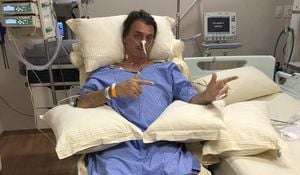South Korea is set to ease restrictions on medical equipment exports to Russia, marking a significant shift in its trade policy amid continuing geopolitical tensions. Starting February 28, the South Korean government will lift sanctions on the export of certain medical devices, as reported by the South Korean Ministry of Trade, Industry and Energy.
According to the ministry, this decision was prompted by difficulties faced by local companies trying to export medical goods to Russia. The ministry stated, "The export of medical equipment to Russia is exceptionally exempt from the need for individual permits," which is seen as a move aimed at facilitating humanitarian efforts.
The changes will allow for the export of equipment like X-ray machines and other diagnostic tools without the stringent permit requirements previously enforced. This exemption is particularly notable because the government highlighted the low likelihood of these medical items being repurposed for military use, saying, "There is little chance of this medical equipment being used for military purposes."
Sweeping sanctions imposed by South Korea since joining U.S.-led sanctions on March 24, 2022, had restricted various exports, including advanced technology and industrial products, impacting around 1,402 types of goods. Now, with the easing of restrictions on medical equipment, the Seoul government aims to balance its international obligations with the humanitarian needs arising from the conflict.
This adjustment marks South Korea's response to challenges voiced by exporting companies, which have struggled to navigate the complex regulations associated with sending medical materials abroad. The country hopes to redefine its stance on humanitarian goods, finding ways to support health care needs without compromising safety or compliance with international laws.
Experts predict this move could also benefit South Korean brands like Hyundai, Samsung, and LG, as the country contemplates re-entering the Russian market for various goods. The easing of restrictions on medical equipment could pave the way for broader commercial engagement, especially as discussions around global supply chains intensify.
The overall geopolitical situation remains precarious, and South Korea's decision could reflect its need to address domestic economic pressures as well as ethical concerns stemming from the humanitarian crisis. Yet, it signals to the world the potential for nuance within international sanctions frameworks.
With this new policy, South Korea joins other nations reconsidering their approaches to trade with Russia, especially concerning humanitarian issues. The shift raises important questions about the balance of political principles with humanitarian obligations, as countries navigate complex diplomatic waters.
South Korea's decision is also drawing attention to the humanitarian dimensions of trade. Critics and supporters alike are focusing on the potential impacts this shift may have on the dire medical needs faced by many within Russia due to the precarious health situation exacerbated by the current geopolitical climate.
Overall, the change is significant and reflects both operational realities for South Korean businesses and the broader challenges of international relations amid conflict. Businesses must now prepare to operate under these new guidelines, as uncertainty still looms over future political developments.
Insightful discussions are likely to follow as industry leaders and international policymakers address the ramifications of such trade adjustments. The careful navigation of these policies can help establish long-term relationships and could lead to significant shifts in how nations collaborate on health matters during crises.



